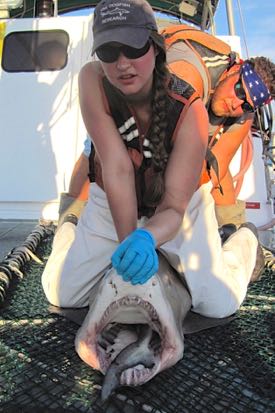Best Student Paper Awards
Each year a committee of faculty and students undertakes the difficult task of choosing the best journal articles from the many high-quality papers written by VIMS graduate students. Each paper considered is either accepted, in press, or published in a high-quality, peer-reviewed journal. The papers reflect the superb quality of the research conducted by VIMS students and the outstanding mentoring of their advisors. Papers are judged for the scope of problem, degree of challenge, magnitude of student effort, hypothesis formulation and testing, and writing style.
The committee members—Rich Brill, Ryan Carnegie, Lúcia Safi, Matt Kirwan, and Christine Meynard—evaluated 7 papers.
PhD Category
This year’s choice for the best paper in the PhD category recognizes the outstanding work of Mr. Solomon Chak.

Solomon’s paper, “Evolutionary transitions towards eusociality in snapping shrimps,” appeared in Nature Ecology & Evolution and was co-authored by his advisor Emmett Duffy, postdoc advisor Dustin Rubenstein, and the group’s long-time collaborator Kristen Hultgren of Seattle University.
Solomon’s paper is a landmark in our understanding of the evolution of cooperation within animal societies, one of the major transitions in the more than 3-billion-year history of life and a problem that challenged Darwin himself. Advanced social life, or eusociality, was discovered in coral-reef shrimp 20 years ago, confirming a general mechanism underlying animal cooperation. But a key question remained: How did eusociality arise in the sea? Solomon’s paper showed that shrimps evolved eusociality along the same trajectory as insects, by expansion of family groups. His results strongly affirm the importance of both ecology and genetic relatedness in evolution of animal societies, one of nature’s most fascinating and enduring puzzles. This work will very likely feature in future college textbooks.
Master's Category

The choice for best paper in the Master's category for 2016 recognizes the outstanding work of Ms. Cassidy Peterson.
During the 1970s, industrialized fishing and release of the film ‘Jaws’ greatly increased the worldwide harvest of coastal sharks. By the late 1980s, many stocks were depleted and several species were threatened with extinction. The U.S. enacted conservation measures in the 1990s, but the likelihood that populations would rebound remained highly uncertain.
In her Fish and Fisheries paper titled ‘Preliminary recovery of coastal sharks in the south-east United States,’ Cassidy joined with Rob Latour and colleagues from South Carolina, Georgia, Florida, and Texas to provide evidence suggesting that 7 of the 8 species examined are showing signs of recovery from past exploitation. Their analysis is one of the most comprehensive evaluations of shark populations in the world, and in just 2 months, the paper has garnered accolades from leading fisheries scientists; mentions in dozens of regional, national, and international media outlets; and Twitter activity in 5 continents.

